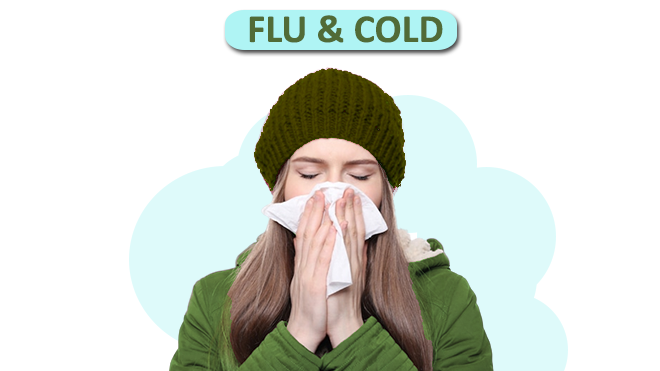WHAT IS THE DIFFERENCE BETWEEN FLU AND A COMMON COLD?
It is not commonly realised that the Flu and common cold are different diseases.
Their causation and symptomology, prevention and treatment are all different.
FLU – Short for Influenza, Flu is caused by a group of viruses called – yes you guessed it- influenza virus.
COMMON COLD- RHINITIS – is caused by a group of viruses called the Rhino viruses (Rhino – nose)
FLU (Influenza)
Though the symptoms of the Flu and the common cold are common the Flu is a more serious infection.
Symptoms of FLU
There will be fever, headache, bodyache, cough, throat discomfort and symptoms can sometimes be quite severe. This is particularly true if the patient is elderly, is previously ill from other diseases like Diabetes, or has a poor lung on account of long-standing Asthma or COPD. Though the Flu settles down in seven days or so the elderly may take longer and still be left with lingering weakness and cough.
Prevention of FLU
Flu can be prevented by taking the annual Flu vaccine which is available by the latter part of every year. Since the virus mutates we need to take the vaccine annually – the new strains are then included in the vaccine – this prevents against four illnesses – Influenza and parainfluenza A & B.
FLU Treatment
Bedrest, simple over the counter medication for cough.
Antiviral – can be started within 2 days of catching the infection- it reduces symptoms and shortens the duration of the illness
COMMON COLD
Always a Viral infection to begin with, Acute Viral Rhinitis can last for up to 10 days.
It can get secondarily infected by a bacteria after a few days- the second worsening.
Colds do not cause serious health issues like pneumonia, nor do they require hospitalization.
Symptoms of Common Cold
Colds usually cause nasal congestion, nasal blockage, discharge, postnasal drip etc. There may be fever or some pain around the sinuses. Fever is usually low grade.
Treatment of Common Cold
Over the counter simple anti cold medications including an anti-histamine or a decongestant which could be systemic or local. Use simple paracetamol for fever or pain.
Remember – THERE IS NO ROLE OF AN ANTIBIOTIC OR AN ANTIVIAL for a simple common cold.
Avoid Aspirin in children
The elderly or those with hypertension should avoid decongestants.
PREVENTION OF A COLD
Maintain distance from someone already having a cold- wear a mask if unavoidable.
Maintain good hand hygiene, specially in the presence of an infected person
Stay warm humidified and well hydrated
Maintain good Immunity – good diet and good exercise and good rest (sleep).

